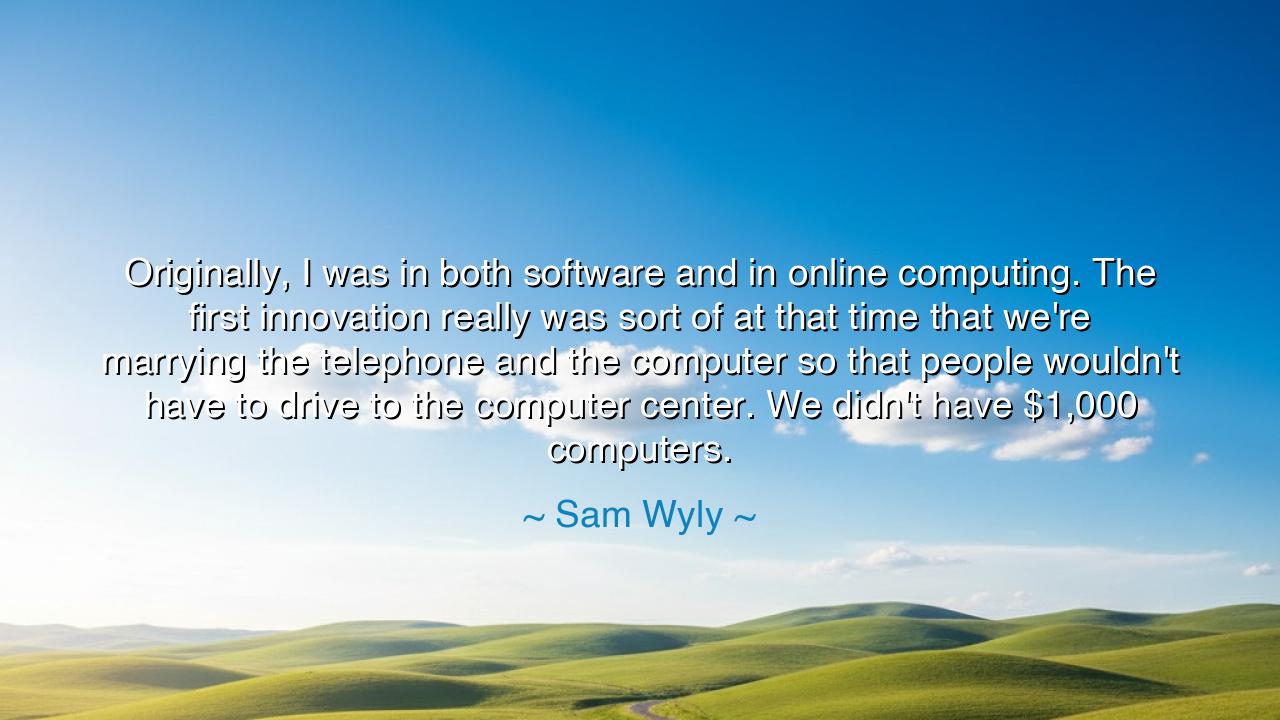
Originally, I was in both software and in online computing. The
Originally, I was in both software and in online computing. The first innovation really was sort of at that time that we're marrying the telephone and the computer so that people wouldn't have to drive to the computer center. We didn't have $1,000 computers.






Hear, O Seekers of Wisdom, the words of Sam Wyly, a man who walked the path of technological innovation and foresaw the marriage of two mighty forces—the telephone and the computer. In his words, we find a moment in time when the world was on the cusp of transformation, when technology was about to break free from its restrictive, centralized nature and enter the realm of personal empowerment. His declaration speaks not only of innovation, but also of the human spirit's unyielding quest to simplify and expand the horizons of possibility.
In the ancient wisdom passed down through the ages, we hear tales of innovators—of Daedalus, who crafted wings for his son, Icarus, to soar above the earth, and Archimedes, whose inventions and principles bridged the gap between human understanding and divine possibility. Wyly's words carry a similar sentiment: to combine seemingly disparate forces, not for the sake of mere curiosity, but to usher in a new era. The telephone, once a revolutionary tool for distant communication, and the computer, a mysterious machine capable of storing and processing knowledge, were to become one, creating the potential for a new way of life. The merging of these two giants was an act of visionary power, one that would soon reshape the very fabric of society.
Consider, O Seekers, that in the earliest days of computing, men and women had to journey to distant computer centers, vast temples of silicon and circuitry where knowledge was guarded. It was a time when only the most wealthy and privileged could access the computing power that today we carry in our pockets. Wyly, like an ancient alchemist, recognized the need for a shift—an innovation that would free the people from the confines of these towering, impersonal centers of learning. He envisioned a world where computers could reach into homes, not with grandeur or expense, but with simplicity and accessibility. This vision would lay the foundation for the personal computers that would soon find their place in every household.
In ancient times, when the great minds of civilization crafted their ideas, they too sought to overcome barriers—whether geographic, cultural, or material. Alexander the Great, for example, sought to unite the known world under a single banner, driven by an understanding that borders and distance should not limit the human spirit's reach. Likewise, Wyly's innovation was not only about making computers more accessible—it was about breaking down barriers between human beings and the tools they needed to advance their minds, their work, and their lives. Technology was becoming a bridge, not just a tool, and it was to be wielded by the many, not the few.
The story of the telephone and the computer intertwined in the way that dreamers and pragmatists come together to change the course of history. The telephone, once a luxury, became ubiquitous. The computer, once a behemoth of corporate and governmental use, would become small enough to hold in one's hand. But this progress, this democratization of knowledge, did not come without its challenges. Much like the ancient journeys of the hero, the path of innovation was fraught with struggle. Resources were scarce, and yet the spirit of the creator never faltered, for it knew that the end goal would bring forth a new dawn for humanity.
The lesson of Wyly's vision is clear: that progress, true progress, is not simply about technology itself, but about how we use that technology to empower the people. To make something once reserved for the few available to the many, to break down the walls of separation, whether by distance, wealth, or access, is the path of the true innovator. His words remind us that we must never stop seeking ways to remove the barriers that hinder our collective potential, whether those barriers be physical, economic, or social.
Let us then, O Seekers, take the lesson of Sam Wyly and apply it to our own lives. Ask yourselves: how can you simplify the complexity around you? How can you use innovation to bridge gaps, to empower those around you, and to unlock potential that is otherwise hidden behind artificial boundaries? Perhaps you will find your own calling in the quest to democratize knowledge, to make the inaccessible available, and to ensure that the tools of progress are not for the privileged, but for all who seek them. As Wyly did, we too can harness the power of visionary thinking to create a future where technology serves the many and not just the few.






AAdministratorAdministrator
Welcome, honored guests. Please leave a comment, we will respond soon